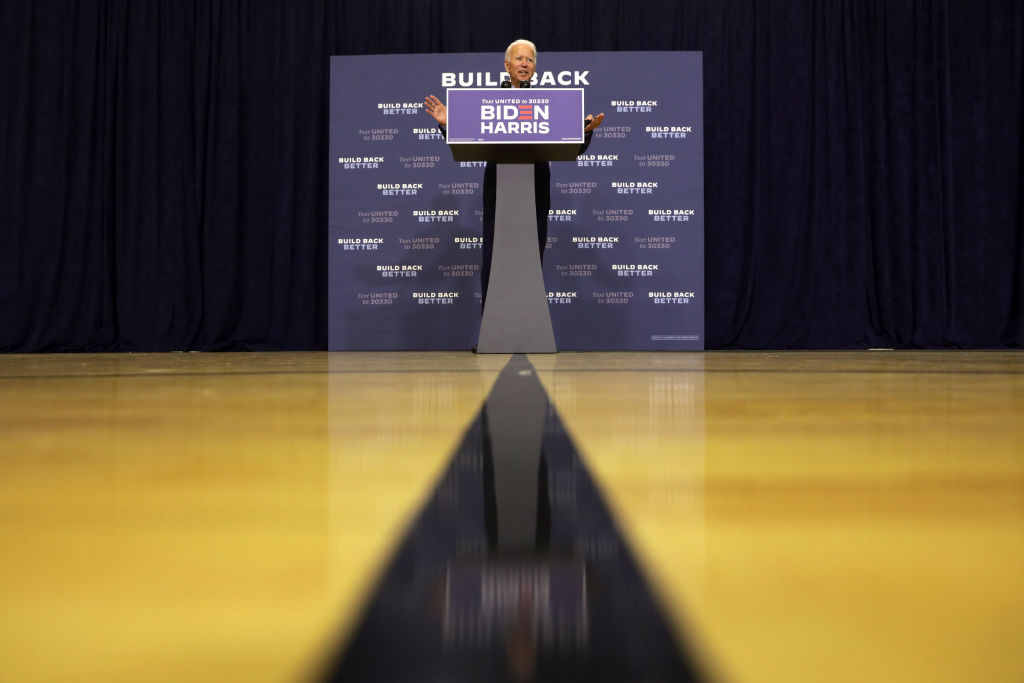
US President-elect Joe Biden’s income-redistribution and green-energy programs are set to be eviscerated by the US Senate, even if the Democrats gain a spare majority by winning both Senate run-off races in the southern state of Georgia.
The elements of his economic agenda most likely to survive are those with a protectionist flavour that could be supported by at least some of the Republican backers of outgoing President Donald Trump.
Biden went to the election promising to boost spending on social and environmental programs by US$5.4 trillion over a decade while raising an additional US$3.4 trillion in additional taxes aimed exclusively at top income earners and corporations.
It was not as wild as the US$30 trillion spending plan developed by former Democratic rival Elizabeth Warren or the US$40 trillion proposal of the other radical contender Bernie Sanders. But the Biden plan was calculated to keep the supporters of both those campaigns onside and voting.
Biden promised his administration would expand the coverage of President Barack Obama’s healthcare package while introducing free and universal pre-kindergarten education, minimum family paid leave and big boosts to social security and housing initiatives.
The election policy set a target of carbon-neutral US electricity generation by 2035, to be achieved by US$2 trillion of targeted spending initiatives, rather than through a carbon tax.
To partially offset these costs, the Biden team promised to raise the company tax rate from 21% to 28% and introduce a minimum company tax rate of 15% for businesses with incomes over US$100 million. There would be a penalty payroll tax on incomes above US$400,000 and an increase in capital gains tax.
There is no prospect of the Republicans supporting these tax increases. The president has some latitude to use executive orders to redirect spending and Biden will use that tool, but it won’t yield enough to finance a program of the ambition outlined to voters.
If the Democrats win the two run-off Senate elections, to be held on 5 January, the Senate will be split evenly with 50 seats each for the Democrats and Republicans, in which case Vice President Kamala Harris would have the deciding vote, delivering a Democratic majority.
However, it takes a 60% majority to force a US Senate vote on major tax and spending bills. Without it, the opposition can keep on debating in a filibuster until the proponents give up.
The only obvious wriggle room is provided by the Senate’s ‘Byrd Rule’, which allows three pieces of legislation to be passed each year with a simple majority, with one covering tax, another spending and the third the debt ceiling, with the proviso that they aren’t allowed to generate a lasting increase in the deficit.
If the Democrats win only one of the Georgia Senate seats, they will lack even a simple majority and will have to rely on luring Republicans to get anything through.
The Trump administration used the Byrd Rule to pass its tax reforms in 2017, so it can be used for radical measures. However, it will come down to what the Biden administration decides to prioritise.
Lifting the company tax rate is unlikely to be close to the top of the list, regardless of what happens with the Georgia vote. However, a border levy on the goods of countries with high carbon emissions could be.
Biden has described climate change as ‘the number one issue facing humanity’ and his climate policy suggests ‘carbon adjustment fees’ may be imposed on imports. Since a border tax would principally target China, it would have some Republican support.
The European Union is developing a border carbon tax that would target goods from nations that don’t have concrete plans to achieve carbon neutrality. There’s some risk to Australian steel and aluminium exports to both Europe and the US in the absence of a more forthright carbon mitigation policy from the Australian government.
Biden also advanced a set of ‘Buy American’ policies that had Trump complaining of plagiarism. These include a proposal to require US$400 billion in government procurement to favour US firms. Such a policy would, at first glance, contravene World Trade Organization requirements. Biden has said he would work with allies to reform the trade rules, saying it should be possible for the government to dictate that taxpayers’ dollars are spent in their own country.
Another proposal with a strongly Trumpian ‘America first’ flavour is to introduce a 10% surtax on imports from firms that had shifted manufacturing away from the US. This would be matched by a 10% ‘Made in America’ tax credit for companies bringing offshore manufacturing back to the US. While measures like these may win bipartisan support, they are novel tax law and may take time to design and implement.
One of the reasons Biden won the Democratic nomination was because he was seen as the best chance to win back the working-class voters in the mid-western manufacturing heartland who had deserted the Democrats for Trump in 2016.
Biden was indeed successful in winning back Pennsylvania, Michigan and Wisconsin but will be beholden to manufacturing lobbies in those states.
It’s difficult to envisage Biden investing much of his political capital in joining the Comprehensive and Progressive Trans-Pacific Partnership, which was formed at the initiative of Japan and Australia after Trump pulled out of the original Trans-Pacific Partnership negotiated by the Obama administration.
One element of the tax plan that Biden took to the election which may survive in some form is a proposal to strengthen the treatment of company profits recorded in tax havens. Biden proposed doubling the special tax on global intangible low-tax income to 21% and preventing companies from averaging their global profits.
These measures would be consistent with the OECD’s efforts to strengthen tax collections from global companies and would forestall European nations from pressing ahead with special taxes on the (mainly US-based) digital services companies.

